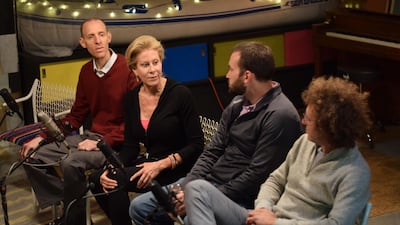Getting on to The Pitch podcast is a big deal for US start-ups.
So much so that one founder sent a big basket of pears to host Josh Muccio after he vetoed the business for season two. A sweet gift? More like sour grapes, since he had once said on the show that he hated pears.
The Pitch - in which real entrepreneurs pitch real investors for real money in real time - was launched independently in 2015 and recently acquired by Gimlet Media. “It’s a distillation of that moment that every founder in every company goes through where founders are pitching investors and there’s that dance going on - is this just an idea or does it become something more?,” says Gimlet Media founder and CEO Alex Blumberg.
The old archive has been trimmed from 50-plus episodes to 12 favourites so season 2 is the first to be given the Gimlet treatment. Like Gimlet’s own first show, StartUp, that means a good library of jingles and an overlay audio track from Mr Muccio narrating and commentating on each pitch, featuring one founder and a panel of investors.
Indeed, it is fortuitous that Gimlet is the company to have acquired The Pitch as StartUp was one of the inspirations for the show, along with US TV show Shark Tank. "It definitely feels like things came full circle," Mr Muccio tells The National.
It’s also been good, personally, for Mr Muccio - who previously ran his own e-commerce business - to have the support of a professional podcast company. He no longer has to scrabble to sell his own ads for the show, as he did when he ran it independently.
Each weekly episode is around 30 minutes long and the show is released weekly almost year-round.
So far the show has been recorded in Silicon Valley and New York’s "Silicon Alley" but Mr Muccio “absolutely” wants to take it to other hubs - even possibly Dubai, Singapore and London. “We’d like to engage with as many different startup hubs as possible,” he adds. “Right now, we’re looking at possible locations for recording season four.”
_______________
Read more:
US-based podcaster puts women and the workplace first
Hackers are now after your air miles to sell on the dark web
_______________
One of the best success stories so far, says Mr Muccio, has been a company called Teamable, which turns contacts from social networks into recruitment referrals. It raised $300,000 after coming on season two, before making $5 million in its series A venture capital funding.
Hykso, a Fitbit for contact sports such as boxing and mixed martial arts, is also doing “really well”, while Babyscripts (whose app virtually connects doctors to their pregnant patients at key milestones) has raised $5m in series A funding – “even though the founder really screwed up after his pitch and ended up losing a lot of the funding that was committed on the show”.
The Pitch has been named one of the best podcasts for entrepreneurs by Inc and Forbes. It features Jillian Manus, a major investor in the start-up world and a partner at Structure Capital, Howie Diamond from Ranch Ventures, who is looking for social enterprises, and Sheel Mohnot, a partner at 500 Startups who sold his own start-up to Groupon and was the first investor-judge on the show.
The investors give honest and often painfully raw feedback to the show on the pitches they hear.
In season two the five venture capitalists invested $1.5m in the featured companies; Teamable received money from two separate funds that Ms Manus is involved in.
The show is an invaluable source of tips for entrepreneurs looking to get funding – although, for some, no show will be as engaging or insightful for young businesses as the first season of StartUp.
For hungry entrepreneurs hoping to make it onto the show, Mr Muccio has simple advice: “Be bold and then shut up.”
“Make your pitch,” he says. “Hopefully it’s compelling. But then shut up and listen. You want to start a conversation, not bore them with your ever-expanding list of product features.
“The first pitch is like a first date; you just need to show them what you’re doing and that you’re open to feedback. Those may sound like contradictory statements but it’s exactly the balance that you need to strike.”

